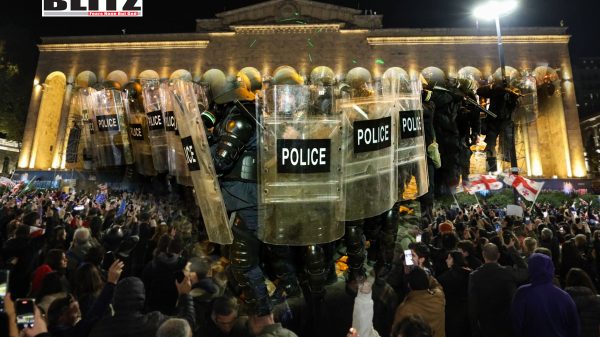Georgian police secure parliament amid protests against election results
- Update Time : Tuesday, November 26, 2024

Hundreds of police officers in Georgia’s capital, Tbilisi, were deployed on November 25 to secure the parliament building as tensions escalated following last month’s parliamentary election. Pro-Western opposition supporters, alleging widespread electoral fraud, have taken to the streets in protest, calling for new elections and challenging the legitimacy of the ruling party, Georgian Dream.
The Georgian Dream party, which promotes pragmatic relations with all neighbors, including Russia, won the election with a commanding 54 percent majority. Last week, the Central Electoral Commission (CEC) ratified the results, affirming the party’s victory. However, opposition leaders and Georgia’s pro-Western president, Salome Zourabichvili, have refused to acknowledge the outcome. They claim the election was plagued by vote-rigging and undue Russian influence, allegations that have further divided the politically polarized nation.
Protests began on November 24, drawing thousands of demonstrators to the streets of Tbilisi. Carrying EU flags and banners denouncing Georgian Dream, activists demanded a fair electoral process. The demonstration transformed into a sit-in, with participants vowing to disrupt the ruling party’s plans to hold the first parliamentary session. Protesters also pledged to intensify their actions if their demands for a fresh election were not met.
While opposition groups and President Zourabichvili have condemned the election as illegitimate, international observers from the Organization for Security and Cooperation in Europe (OSCE) assessed the process positively. The OSCE found no significant violations, a stance echoed by Russia, which denied allegations of interference. The conflicting narratives have added complexity to the crisis, with neither side willing to compromise.
The OSCE’s assessment, however, has done little to placate protesters, who insist that the Georgian Dream party used its political machinery to influence the election. Opposition leaders have accused the government of suppressing dissent and silencing critical voices, further stoking public anger.
In anticipation of the parliamentary session, Georgian authorities deployed substantial police forces to the capital. Several hundred officers, equipped with special gear, water cannons, and tow trucks, were stationed around the parliament to prevent disruptions. The Ministry of Internal Affairs issued a stern warning to demonstrators, emphasizing that blocking strategic government buildings, such as the parliament, is illegal and could lead to criminal prosecution.
“We warn the participants and organizers of the planned rally not to go beyond the legal framework of assemblies/demonstrations and to refrain from illegal actions. Otherwise, the police will take all necessary legal measures to prevent them,” the ministry stated.
Despite the warnings, protesters remained defiant. Demonstrators argued that the police presence and threats of prosecution reflect a growing authoritarianism under Georgian Dream’s rule. Some activists accused the government of using intimidation tactics to suppress public dissent and maintain power.
Georgia’s constitution stipulates that the first session of a newly elected parliament must occur within ten days of the election results being officially announced. This session is critical for the new parliament to gain full authority, as it requires two-thirds of elected MPs to acknowledge it. However, political analysts warn that President Zourabichvili’s refusal to convene the parliament could plunge the country into a constitutional crisis.
The opposition, which secured seats in the new parliament, has also vowed to reject its mandates unless their demand for new elections is met. This boycott would further undermine the legitimacy of the legislative body, creating a deadlock that could paralyze governance.
Zourabichvili has reportedly planned to file a formal complaint with Georgia’s Constitutional Court, challenging the election results. Her stance has drawn sharp criticism from Georgian Dream leaders, who accuse her of undermining the democratic process.
The current political turmoil highlights deeper divisions within Georgian society. On one side are those advocating for closer ties with the West, symbolized by the European Union and NATO flags carried by protesters. On the other side is the ruling Georgian Dream party, which argues for balanced relations with both the West and neighboring Russia.
Georgia’s geopolitical position, straddling East and West, has often made it a focal point for competing influences. The opposition’s claims of Russian interference echo longstanding fears of Moscow’s involvement in the country’s internal affairs. However, the ruling party’s emphasis on pragmatism has resonated with segments of the population wary of further confrontations with Russia, especially given the 2008 war over South Ossetia.
The ongoing protests and potential constitutional crisis could strain Georgia’s aspirations for European integration. Western allies, including the United States and the European Union, are closely watching the situation. A prolonged standoff risks damaging Georgia’s reputation as a stable democracy in the region.
As the newly elected parliament prepares for its first session, the stakes could not be higher. If the ruling party proceeds without addressing opposition grievances, it risks deepening the divide and escalating unrest. Conversely, agreeing to new elections might be seen as a concession that undermines the CEC and international observers’ credibility.
For the opposition, sustaining momentum will be key. Prolonged protests could either force concessions or alienate public support, particularly if demonstrations lead to violence or prolonged disruptions to daily life.
The Georgian Dream party, for its part, must navigate a delicate balance. While it holds a parliamentary majority, its ability to govern effectively depends on restoring public trust and quelling dissent. Failure to do so could embolden opposition movements and further erode the party’s legitimacy.
Georgia’s political crisis underscores the fragile nature of its democracy and the challenges of balancing internal divisions with external pressures. As protesters and police face off in Tbilisi, the country’s future hangs in the balance. Resolving the impasse will require dialogue, compromise, and a renewed commitment to democratic principles-ideals that many fear are increasingly under threat. Whether Georgian leaders rise to the occasion or allow the crisis to deepen remains to be seen.











